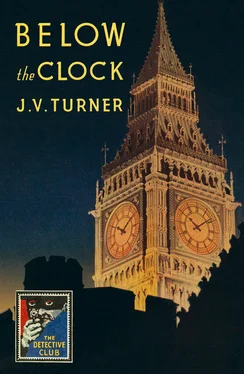Reardon frowned. Then his mouth twitched. His left hand groped until it found a corner of the Despatch Box.
For the first time Members began to suspect that something had gone wrong, that all was not well. Within a few seconds suspicion grew to a certainty. Reardon’s eyes were strange. They ceased to wander, were fixed in a persistent stare. The pupils shone strangely, and the man’s body stiffened until it seemed unnaturally tense.
His appearance changed with each fleeting second. He seemed numbed, almost paralysed. Even the golden light from the sun could not disguise the pallidity of his face. Reardon looked distressingly like a man who stands in a daze after concussion.
A colleague decided that it was time to act. He rose and caught the Chancellor by the tails of his coat from behind.
It seemed that the action was the only thing wanting to upset the Chancellor’s balance. He fell headlong to the floor with a crash!
The moment that followed was one of those in which the whole being is concentrated in the eye. The hush that fell over the House was poignantly dramatic. It was an uncomfortable silence.
Tranter broke the spell by claiming right of passage, and dashing forward to the side of the Chancellor. Members who had sat with the muteness and stiffness of statues found their tongues. Ingram cast the secrets of the Budget all over the table in a frenzied search for water. Abruptly he seized the remains of the claret and seltzer, flung it into the face of the Chancellor. Reardon did not move.
Watson, the P.P.S., recovered sufficiently to run for water. As he hurried the Hon. John Ferguson, President of the Board of Trade, worked with trembling fingers and whipped off the man’s collar. Sam Morgan, anxious to help, but uncertain of the procedure, stood wishing that he were a doctor instead of a Home Secretary.
In the general confusion everyone succeeded in getting in everyone else’s way.
At last Tranter produced some sort of order out of the chaos. As he knelt down by Reardon’s side he gave short, sharp directions to those around him. He was definitely a better doctor than he was an economist. The whispering ceased. There was a silence ladened pause. Then Tranter raised his voice again:
‘Carry him outside at once.’
The prostrate form was seized by half a dozen willing, but clumsy, hands. Reardon’s flaccid muscles writhed under the pull and thrust of the shuffling figures, the trunk bowing as they lifted him. The helpers bustled him into a position they fondly hoped was comfortable. It was a grotesque parody of a chairing. The Chancellor’s head wobbled hideously, the body sank into itself telescopically, looking invertebrate and horribly unhuman, swaying and jolting to each step of the bearers as they staggered with their burden out of the House.
The Members watched the procession with bewilderment. This was something that the Chancellor had not budgeted for! They need have felt no sympathy for the sagging figure.
Edgar Reardon was dead!
BEHIND THE SPEAKER’S CHAIR
‘I SUPPOSE it was apoplexy,’ whispered the Prime Minister.
‘I can’t tell definitely what it was,’ said Tranter. His brows were knitted, and there was a tone in his voice that the other misjudged. The group stood in the long hall behind the Speaker’s Chair. The body of Edgar Reardon lay on a couch against the wall. The figure was dishevelled, the head was supported on the rolled-up jacket of the dead man, one of the legs had slipped off the side of the couch.
‘If there’s any room for doubt,’ said Ingram after a pause, ‘we’d better have him taken across to Westminster Hospital’
The doctor waved his hands impatiently and commented sourly:
‘Oh, I know death when I see it. He was dead when we carried him out of the House. I’m not troubled about that. What’s worrying me is that I can’t figure out how it happened.’
‘But, man, you saw it all yourself,’ protested the Prime Minister.
Tranter’s nerves were ruffled and his temper ebbed. He flung his hands helplessly into the air.
‘Of course, I saw all that you saw,’ he snapped. ‘But I’m a doctor. This, Ingram, is a case for the Coroner of the Household. I don’t want to say much more. An autopsy may show that death was due to natural causes. His heart may have given out; a hundred and one things may have happened. But I’m going to say this now: It didn’t look to me like natural death at the time when it happened and I don’t think it was even now. Just look at him. Does it look right to you?’
The Prime Minister gazed at the corpse and shuddered. Reardon certainly did not look as though his heart had failed him. There was something odd about the expression of the face, an atmosphere of violence about the distorted limbs. For years Ingram had boasted that he was able to cope with any emergency. That faculty, and his solid sense, had won him the Premiership. But now he felt as though his brain were addled as he groped feebly after an idea.
The Cabinet Ministers who had assisted in carrying the Chancellor out of the House stood in a group like frozen images, staring with awed fascination at the corpse, and not trusting themselves to speak.
A little farther away the widow stood against the wall, her body twitching, her startled eyes, distended but dry, turning from Tranter to Ingram, and from Ingram to the remains of her husband. Her face was tragically pathetic. The skin was marble white and her make-up turned her pallor into a shrieking incongruity. The mascara on her eyelids and lashes showed midnight black against a surround of ghastly white; rouge, high on the cheek-bones, was almost silhouetted against the pale flesh, and the lips swerved in a carmine spread. Her green eyes were overshadowed by grief and mascara. Tufts of golden hair caught the rays of the sun as they waved in curls from the side of a black cloche hat.
Watson flitted in the background like a hovering moth, straying from Tranter’s side to whisper condolences to the widow, moving again to stare at the corpse as though he still disbelieved that Reardon was dead. As seconds passed Ingram’s brain began to function again.
‘Tranter,’ he said, ‘this is absolutely absurd. I can’t understand what on earth you’re talking about. Edgar Reardon was a man without a care in the world. Why should a man with position, money, good health, and a devoted wife commit suicide? And you suggest that he didn’t die a natural death! The idea is preposterous.’
‘You’ve been thinking instead of listening,’ remarked the doctor caustically. ‘I did not say that he committed suicide at the time of his death, and I don’t say so now. I haven’t mentioned suicide.’
‘But … but …’ Ingram paused, bewildered. He did not complete the sentence. Before he could collect his scattered thoughts a shrill laugh interrupted him, a peal that broke abruptly at the end of a high trill. If the roof of the House had fallen through it would not have created a greater sensation than the unexpected sound. On the overwrought nerves of the men in the hall the effect was hair-raising. They wheeled round together.
Mrs Reardon stood with her head tilted back, the face entirely mirthless, the mouth twisting with spasmodic jerks, the eyes wild and distended. Here, at least, was a case which Tranter could treat with confidence. Before he reached her side Mrs Reardon had ceased to laugh and her body was convulsed by sobs. Watson handed the doctor a glass of water. Tranter threw it into the face of the hysterical woman. As she quietened down he tried to speak to her persuasively. The effort was useless. She was quarrelsome and querulous. Watson stood by her side, gripping her trembling hands.
While Tranter was attempting to coerce the woman a newcomer arrived, walked across the hall towards them. He was tall, and a trifle too elegant, his clothes immaculately tailored, his features sharply defined. The grave, dark eyes were luminously brown. He stopped before the widow and bowed. Mrs Reardon moved Tranter to one side and stared at the newcomer ungraciously, almost venemously.
Читать дальше












